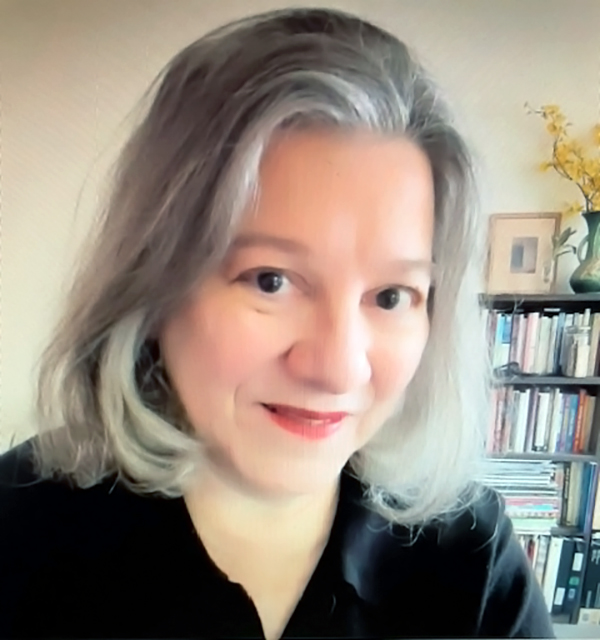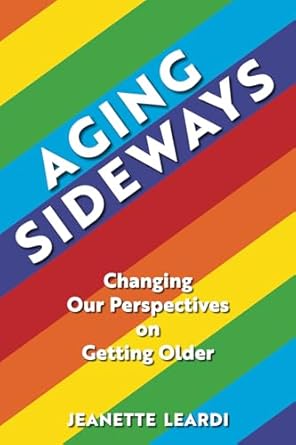Two years ago, on October 4, 2022, I wrote about “55 Select Books on Longevity and Productive Aging.” Soon afterward, I heard from Jeanette Leardi, a social gerontologist in Portland, Oregon, who suggested I add Tracey Gendron’s Ageism Unmasked: Exploring Age Bias and How to End It. After adding the book to the original list, I later interviewed Tracey for my blog: “Three Questions for Dr. Tracey Gendron, Author of Ageism Unmasked: Exploring Age Bias and How to End It.”

Jeanette has become a go-to resource on matters related to aging; among other media outlets, she has been interviewed on WBUR/NPR’s “Here and Now,” as well as by Next Avenue, and The New York Times.
Now Jeanette has a new book, Aging Sideways: Changing Our Perspectives on Getting Older, and I am grateful to her for answering my questions about the book and its readership, the field of social gerontology, and her role within it.

How would you characterize the research, lived experience, and key messages represented in your new book, Aging Sideways: Changing Our Perspectives on Getting Older?
The answer to this question is found in my book’s title. What does it mean to age “sideways”?
One of the biggest problems in our society regarding age is that we are basically segregated from other generations on a daily basis. Very young people go to school and only regularly encounter older people, if at all, in their own families. A great deal of age discrimination exists in the workplace, and so there is usually a dearth of older workers whom companies seek to hire and retain. Our lifestyles encourage us to stay within our dwellings rather than socialize widely in our neighborhoods. Given these conditions, it’s no wonder that we harbor misperceptions about people who are much younger or older than we are and resort to stereotyping them.
Add to this our entrenched social belief –– constantly reinforced by the media –– that it’s much better to be young than to be old. We value what’s “new and improved” over what’s traditional and tried-and-true. Every age, every stage of life has a value of its own, as well as its problems, challenges, and opportunities for growth. Moving through age shouldn’t be a zero-sum process. At every stage we lose some traits and gain others.
The sideways approach to understanding aging is to take off our side blinders that keep us looking in this traditionally narrow, one-directional, zero-sum way and widen our view, tilt our minds into slightly cocked positions, and acquire a different perspective that’s wider, more surprising, and ultimately truer picture of what it means to become older.
My book offers strategies for how to do this and many quirky, surprising examples of this approach.
Social gerontology will probably be an unfamiliar term to many readers. Can you describe the field, and your particular role within it?
Gerontology is the study of aging from birth to death, with a special emphasis on later life. The ways in which we age are affected by all kinds of factors: environmental, political, geographic, and economic, to name a few.
A social gerontologist studies and reflects on the cultural factors (gender, race, ethnicity, level of education, family structure, place of residence, income, health, personality, etc.) that influence the length and quality of life of an individual or group as they age.
If your book were to be included in the syllabi for university and/or graduate schools, what would be some ideal fields of study that could benefit from reading and studying it?
Considering that to be alive means to be aging, any field of study involving humans could benefit from understanding the challenges and rewards of growing older. So I’d say that my book can be of value to students of psychology, anthropology, sociology, economics, political science, education, architecture, the arts, medicine, religion/philosophy,…shall I go on?
Of course, while I would eagerly welcome Aging Sideways being included in college and grad school syllabi, I hope even more fervently that it would attract readers in the general public, the “front lines” of aging awareness, as I like to refer to them. If all of us can just change our minds and dispel the fear and dread of getting older, consider how much more compassionate, engaged, and productive our society would be –– not to mention how much happier and hopeful we would all feel about living through all the stages of our lives!
